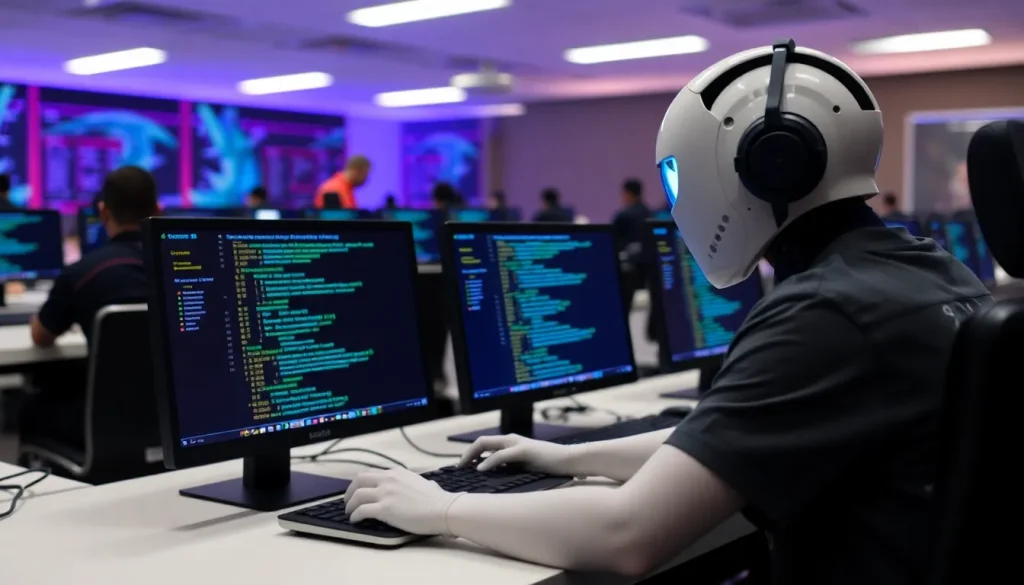Gemini AI solves coding challenge that baffled 139 teams at ICPC

In recent years, the intersection of artificial intelligence and competitive programming has begun to reshape how we perceive problem-solving. The advances in AI, particularly through projects like Google’s Gemini, have raised questions about the limits of human capability in the face of sophisticated algorithms. As we delve into the performance of Gemini in the prestigious ICPC World Finals, we explore the implications of AI’s growing prowess in such demanding academic environments.
Gemini's impressive performance at ICPC
The International Collegiate Programming Contest (ICPC) is renowned not just for its challenging problems but also for the pressure it puts on competing teams. In this high-stakes environment, only accurate solutions earn points, and the time taken to solve problems directly affects the final score. Gemini showcased its remarkable capabilities by rapidly climbing the ranks, successfully solving eight problems within just 45 minutes. Ultimately, after 677 minutes of intense competition, Gemini 2.5 Deep Think secured a commendable second-place finish among university teams, achieving ten correct answers.
Challenging problems and innovative solutions
Among the complex challenges presented at the ICPC, Problem C stood out as particularly daunting. This problem revolved around a multi-dimensional optimization scenario involving fictitious "flubber" storage and drainage rates. Despite its perplexing nature, which left all human teams stumped, Gemini approached it through a unique lens.
Google highlights the infinite combinations of configurations for the flubber reservoirs, showcasing the problem's inherent complexity. To navigate this, Gemini strategically assigned a priority value to each reservoir, enabling the model to apply a dynamic programming algorithm to identify the most efficient configuration. After dedicating 30 minutes to this intricate problem, Deep Think successfully employed a nested ternary search to pinpoint the correct values.
Gemini's historical analysis and future potential
While Gemini's solutions for the current ICPC were rigorously evaluated by event coordinators, Google took a step further by testing Gemini 2.5 on previous ICPC problems. This internal analysis revealed that Gemini achieved gold medal status for the question sets from both 2023 and 2024. Such consistent performance raises intriguing possibilities for the future of AI in competitive and practical applications.
Google posits that Gemini's success in these advanced academic contests could signal a transformative shift in industries like semiconductor engineering and biotechnology. The capability to tackle intricate problems that require multi-step logic makes AI models akin to Gemini 2.5 invaluable assets for professionals working in these fields. Notably, when combining the analytical prowess of top-ranking university teams with AI, there’s a potential to derive correct solutions for all twelve ICPC problems.
Economic considerations of AI in competitive programming
However, deploying such powerful AI models is not without its challenges, particularly when it comes to resource consumption. While Google remains tight-lipped about the exact power requirements for Gemini's participation in the ICPC, it is reasonable to conjecture that the energy demands were substantial. Even simpler consumer-facing AI models currently struggle to achieve profitability due to their high operational costs.
Yet, the ability of AI to solve complex, previously insurmountable problems could justify the investment in this technology. The economic viability of AI in competitive programming and beyond hinges on the balance between cost and the value derived from its solutions.
The implications of AI on future competitions
The growing capability of AI, exemplified by Gemini, raises important questions about the future of competitive programming. As AI systems become more adept at solving complex problems, the line between human competitors and AI assistance may blur. Some critical implications include:
- Training and Learning: Human coders may need to adapt their training methods to incorporate AI tools, learning to work alongside these systems.
- Ethical Considerations: The role of AI in competitions could lead to debates about fairness and the nature of competition itself.
- Innovation Acceleration: AI could drive innovation in algorithm design, creating new avenues for problem-solving that were previously unexplored.
Looking to the future: AI's role in academia
The implications of Gemini's performance extend beyond the ICPC. As AI continues to evolve, its integration into academic settings may become increasingly prevalent. AI systems like Gemini could revolutionize how students learn programming, offering personalized feedback, assistance, and even real-time problem-solving capabilities.
This shift could lead to a more collaborative approach to learning, where students work alongside advanced AI to tackle complex challenges. The potential for enhanced educational outcomes is significant, as AI-driven methodologies could provide deeper insights and foster a more engaging learning environment.
AI and human collaboration: A new paradigm
As we move forward, the relationship between AI and human intelligence may transform dramatically. Rather than viewing AI as a competitor, there is an opportunity to embrace a collaborative model where both human creativity and AI efficiency contribute to groundbreaking solutions.
With platforms like Gemini paving the way for advanced problem-solving, the focus may shift from merely competing against AI to leveraging its strengths in various fields. This cooperative spirit could redefine not only competitive programming but also the broader landscape of technology and innovation.
To witness the ongoing evolution of AI in competitive environments, consider watching this engaging video that explores its impact in the programming arena:




Deja una respuesta